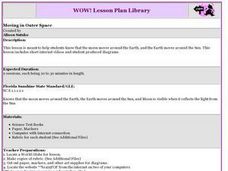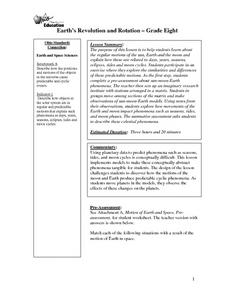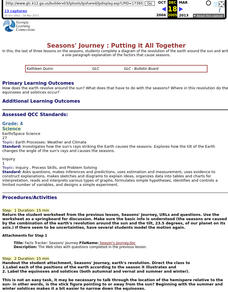Curated OER
The Celestial Sphere and Circumpolar Motion
Students investigate the celestial sphere and circumpolar motion. In this science lesson, students view an applet, The Celestial Sphere and Circumpolar Motion. Students discuss the Earth's rotation and stellar movement.
Lake Afton Public Observatory
Shadows, Angles, and the Seasons
Shine some light on the topic of seasonal change with this collection of activities. Whether it's by measuring the change in the length of their shadows, or modeling the earth's orbit around the sun using a lamp and a globe, these simple...
Curated OER
"Vary" Bright Days
Students explore how the Earth's axial tilt and revolution around our sun lead to differences in day length through the year. In groups, they create and use a model of the earth on its axis to demonstrate the concepts.
Curated OER
Wobbling in Circles
Sixth graders role play the parts of the sun, the moon and the Earth as they simulate the concepts of revolution and rotation. They act out the parts in small groups and discuss the concepts as a class.
Curated OER
Properties of Earth: Word Search
In this word search worksheet, students search for words related to the Earth, the sun and it's movements. Terms include seasons, features, and movements.
Curated OER
The Seasons of the Earth
In this seasons worksheet, 3rd graders study a diagram that shows the Earth's rotation around the sun as it relates to the seasons. They describe the position of the Earth during each season in a short answer format.
Curated OER
Sun Shadow Cycles
High schoolers use diagrams to review how the Earth rotates around the sun. In groups, they use the same diagrams to explain how the sun shadows are produced and how they differ between seasons. They describe the Earth's rotation and...
S2tem Centers SC
Seasons
Winter, spring, summer, and fall—take the learning of the seasons beyond the elementary level to the middle school classroom. Curious learners begin by watching videos about the seasons and the rotation of planet Earth. Then, they...
Curated OER
How Big Are Earth, Sun, and Moon?
Third graders draw what they believe is in space on a dry erase board. In groups, they are given a beaker half filled with water and they add a teaspoon of oil, observing the different layers that form. To end the lesson, they identify...
Curated OER
Earth and Seasons
Sixth graders comprehend that the path Earth takes as it revolves around the sun is called its orbit. They also comprehend that the axis is an imaginary line that passes through Earth's center and its North and South Poles. Students...
Curated OER
Chalkboard Challenge: Social Studies Online
If used as an independent review, this presentation could be a quick way for students to study U.S. History facts. Since it only presents a few simple facts, it would not be adequate for a comprehensive review, but a teacher could...
Core Knowledge Foundation
A Time for All Seasons - Winter
As the days get shorter and a chill enters the air, it's time to start teaching your little ones about the wondrous winter season. Through a series of teacher demonstrations, whole-class read alouds and discussions, and hands-on...
Curated OER
Shadow Trackers: From Photography to Writing
Students explore the rotation of the earth. In this science instructional activity, students view photos of various places around the world. Students conduct an experiment in which they can see how the earth's rotation creates shadows on...
Curated OER
Moving in Outer Space
Students participate in a lesson that demonstrates the concepts of rotation and revolution as they pertain to the Sun, the moon, and the Earth. They examine the relative sizes of each. They watch a computer based movie at a subscription...
Curated OER
Solar System: The Four Inner Planets and Earth's Moon and Astronauts
Second graders read THe Magic School Bus: Lost in the Solar System. In this language arts and science lesson, 2nd graders explore the four inner planets. Students view the inner planets using Google Earth.
Curated OER
It's A Meteor
Students complete a webquest to find Earth's relationship to the sun. In this webquest lesson, students complete tasks to understand the effect of the sun on weather and time. Students create a multimedia presentation as an end product...
Curated OER
Science: Day and Night
Pupils listen to the Sky Tellers Native American story, "Ant Dances for Light," and illustrate it. They observe how Earth's rotation results in periods of darkness and light. Students investigate how day length varies throughout the...
Curated OER
Earth's Revolution and Rotation
Eighth graders investigate the regular motions of the sun, Earth and the moon and explain how these are related to days, years, seasons, eclipses, tides and moon cycles. They participate in an exercise where they explore the...
Curated OER
Seasons' Journey : Putting it All Together
Third graders complete a diagram of the revolution of the earth around the sun and write a one paragraph explanation of the factors that cause seasons.
Curated OER
Exploration of the Moon
In this moon activity, students will use a table with facts about the moon to answer questions about the moon's rotation, distance from the Earth, gravity, and temperature. Students will complete 9 short answer questions.
Curated OER
Seasons
Students investigate the reason for seasons on Earth during three activities. They construct a model of the Earth and Sun to identify patterns in the changes of the angle of light on the Earth's surface. Then they conduct a heat...
Curated OER
Our Sun and the Four Seasons
Students discover the relationship between the sun and Earth. In this weather lesson plan, students examine the effect of the sun on the Earth's seasons. Students complete a weather activity using props to simulate the sun and Earth's...
Curated OER
Our Solar System and Seasons
Sixth graders investigate the relative diameters of planets and distances between them and the cause for seasons on Earth using the 5-E Learning Model. They appreciate the size and distances involved with objects in the real universe....
Curated OER
Charting Seasonal Changes
Students research the Earth's patterns of rotation and revolution, create a chart and graph of these patterns and use them to explain the causes of night and day and summer and winter.

























